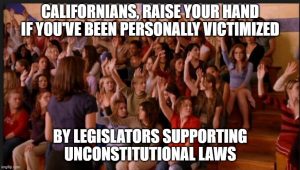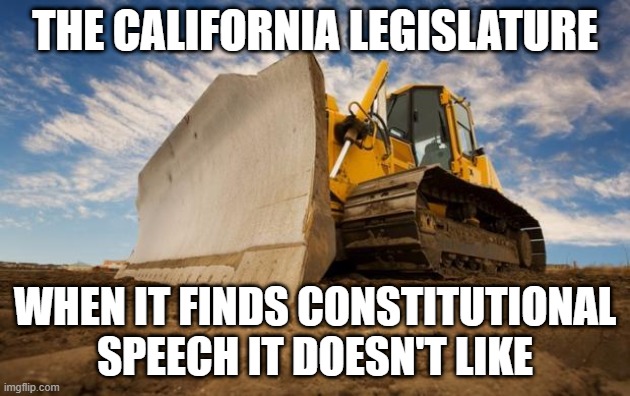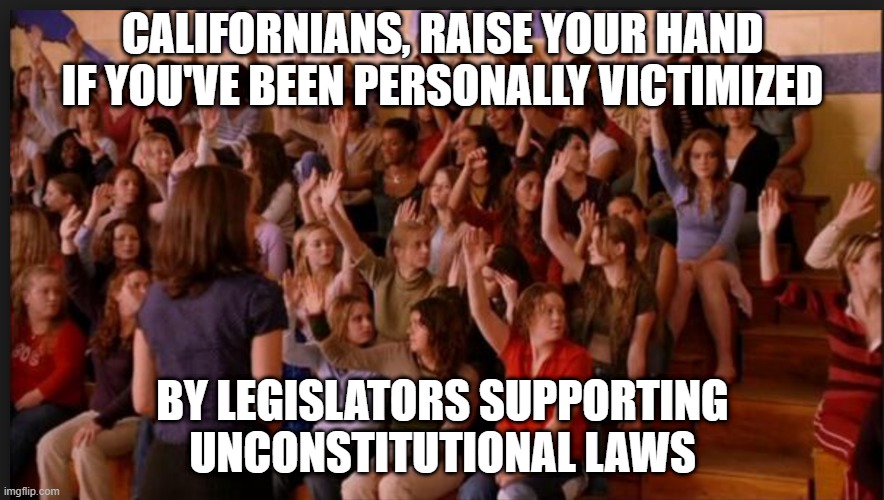 In September, California enacted AB 2839. It seeks to remove certain types of politically themed “materially deceptive content” (including “deepfakes” 🙄) during the election season, except for some labeled parodies and satire. The law provides a private right of action for anyone exposed to the inauthentic content.
In September, California enacted AB 2839. It seeks to remove certain types of politically themed “materially deceptive content” (including “deepfakes” 🙄) during the election season, except for some labeled parodies and satire. The law provides a private right of action for anyone exposed to the inauthentic content.
The law’s challenger goes by the name “Mr. Reagan” on social media, “where he posts (what he alleges is) humorous political content often featuring politicians mocking their own candidacies.” He posted a Kamala Harris video with inauthetic self-denigrating audio. Musk retweeted the video, and it got over 100M views. (Sigh). Gov. Newsom specifically identified this fake Kamala video as something that should be illegal under AB 2839.
 AB 2839 is the kind of complex, broad, multi-faceted, and ambiguous Internet censorship law being produced by state legislatures across the country. The court negatively reacts to its breadth. The court says the new law goes way beyond defamation law (reaching content that doesn’t cause any reputational harm), and the law potentially applies to “almost any digitally altered content.” Plus, the law “relies on various subjective terms and awkwardly-phrased mens rea,” which implicates “vast amounts of political and constitutionally protected speech.” The court summarizes:
AB 2839 is the kind of complex, broad, multi-faceted, and ambiguous Internet censorship law being produced by state legislatures across the country. The court negatively reacts to its breadth. The court says the new law goes way beyond defamation law (reaching content that doesn’t cause any reputational harm), and the law potentially applies to “almost any digitally altered content.” Plus, the law “relies on various subjective terms and awkwardly-phrased mens rea,” which implicates “vast amounts of political and constitutionally protected speech.” The court summarizes:
[constitutional] principles safeguarding the people’s right to criticize government and government officials apply even in the new technological age when media may be digitally altered: civil penalties for criticisms on the government like those sanctioned by AB 2839 have no place in our system of governance.
The court says the law is content-based. It “targets speech within political or electoral content pertaining to candidates, electoral officials, and other election communication,” and “delineates acceptable and unacceptable content based on its purported truth or falsity [so it’s] an archetypal content-based regulation that our constitution considers dubious.” Strict scrutiny applies.
The court recognizes the importance of election integrity, but “this interest must by served by narrowly tailored ends.” Thus:
while a well-founded fear of a digitally manipulated media landscape may be justified, this fear does not give legislators unbridled license to bulldoze over the longstanding tradition of critique, parody, and satire protected by the First Amendment. YouTube videos, Facebook posts, and X tweets are the newspaper advertisements and political cartoons of today, and the First Amendment protects an individual’s right to speak regardless of the new medium these critiques may take. Other statutory causes of action such as privacy torts, copyright infringement, or defamation already provide recourse to public figures or private individuals whose reputations may be afflicted by artificially altered depictions peddled by satirists or opportunists on the internet….
the statute encompasses a broad range of election-related content that would be constitutionally protected even if false and cannot withstand First Amendment scrutiny.

The court is especially troubled by the attempt to regulate political speech:
AB 2839 attempts to sterilize electoral content and would “open[] the door for the state to use its power for political ends.”…When political speech and electoral politics are at issue, the First Amendment has almost unequivocally dictated that Courts allow speech to flourish rather than uphold the State’s attempt to suffocate it.
The court suggests that perhaps labeling requirements standing alone might have passed constitutional muster. However, the court treats this law’s onerous labeling requirements as overreaching compelled speech. In the case of the challenger’s video, the disclosure “renders his video almost unviewable, obstructing the entirety of the frame.”
The court grants a preliminary injunction against the entire bill except for one part about audio-only disclosures. It concludes:
The Court acknowledges that the risks posed by artificial intelligence and deepfakes are significant, especially as civic engagement migrates online and disinformation proliferates on social media. Against this backdrop, the Court does not enjoin the state statute at issue in this motion lightly, even on a preliminary basis. However, most of AB 2839 acts as a hammer instead of a scalpel, serving as a blunt tool that hinders humorous expression and unconstitutionally stifles the free and unfettered exchange of ideas which is so vital to American democratic debate.
Before anyone gets too emotionally invested in this ruling, let’s see how it fares at the Ninth Circuit.
Case Citation: Kohls v. Bonta, 2024 WL 4374134 (E.D. Cal. Oct. 2, 2024). The complaint.
* * *
I note the NY Times’ coverage of this and other contemporaneous California laws all targeting “AI.” Consistent with its typical “view from nowhere,” the NYT said the laws “could offer a road map for regulators across the country who are attempting to slow the spread of the manipulative content powered by artificial intelligence.” It’s true that legislatures across the country are keenly interested in new and innovative approaches to censorship. However, it might have been more appropriate for the article to invest slightly more energy in critiquing the likelihood that this “road map” was just a path towards censorship.
* * *
BONUS: Alongside AB 2839, California enacted AB 2655, the “Defending Democracy from Deepfake Deception Act of 2024.” That law also targets “materially deceptive content” during election season, and it requires “large online platforms” (which may not be very large at all) to create and honor a notice-and-takedown for such content–accepting takedown requests from anyone/everyone–unless the content had the specified labeling.
I was going to do a full blog post on AB 2655, but the AB 2839 ruling makes it clear that AB 2655 suffers many of the same constitutional infirmities as AB 2839, especially the overbroad and vague scope of targeted content. For now, there’s good reason to believe AB 2655 is as unconstitutional as AB 2839.
I’ll add that AB 2655 should also be preempted by Section 230 because the law seeks to impose liability on UGC services for third-party content. The law would permit only injunctions, not damages, but Section 230 immunizes against ANY remedies based on third-party content. Obviously, California can’t override Section 230, but if the legislature is going to blatantly disregard the First Amendment, it will also disregard a preemptive federal statute. ¯\_(ツ)_/¯
Because the court’s enjoining of AB 2839 likely guts AB 2655 as well, here’s the meme again:

More generally, efforts to regulate political or election misinformation are intrinsically constitutionally problematic. I’m sickened that there is so much voter demand for such trash content, but legislatively constricting supply does nothing to abate that demand. In particular, I reiterate the court’s concerns about the partisan enforcement of any anti-political misinformation law. We need to be hardening our institutions against politicians who weaponize existing laws for purely partisan purposes, and laws like AB 2839 and AB 2655 soften our resiliency against the inevitable partisan manipulation.

Recent Comments